|
Harry Hall - Famous Racehorses
Click on a painting below to start the exhibition
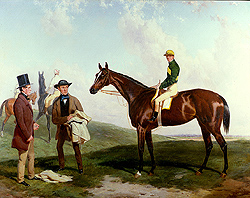 Harry HallBlink Bonny, with J. Charlton Up, Owner & Trainer Harry HallBlink Bonny, with J. Charlton Up, Owner & Trainer |
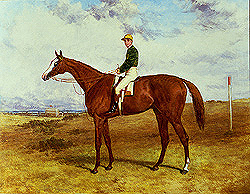 Harry HallBlair Atholl Harry HallBlair Atholl |
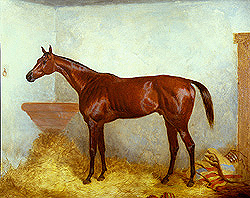 Harry HallSterling Harry HallSterling |
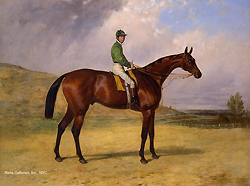 Harry HallPrince Plausible, with G. Fordham Up Harry HallPrince Plausible, with G. Fordham Up |
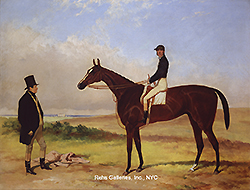 Harry HallWest Australian, with Frank Butler Up & Mr. John Scott (trainer) Harry HallWest Australian, with Frank Butler Up & Mr. John Scott (trainer) |
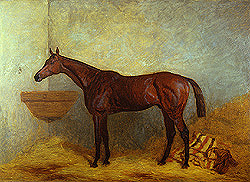 Harry HallIsonomy Harry HallIsonomy |
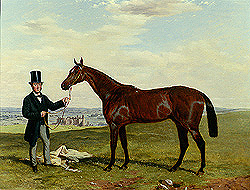 Harry HallThe Racehorse 'Fisherman' Harry HallThe Racehorse 'Fisherman' |
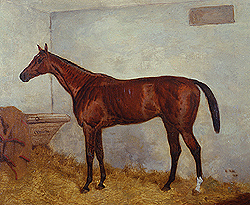 Harry HallCremorne Harry HallCremorne |
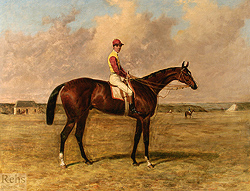 Harry Hall'Fantastic', with Jockey Up Harry Hall'Fantastic', with Jockey Up |
|
The 19th century proved to be one of the greatest periods in English Sporting art, and one of the most sought after artist during the early days was John Frederick Herring, Sr. (1895-1865). Herring captured many of the most famous racehorses of the time on canvas, but there were many other artists whose work was also in demand; among them was Harry Hall.
Born in the fashionable eastern town of Cambridge in 1816, it appears that Hall may have received some of his artistic training from another great Sporting artist - Abraham Cooper (1787-1868).
Hall’s made his first appearance at Tattersalls - working on a number of their publications, including British Racehorses, The Sporting Review, The Field and The Illustrated London News. His earliest exhibited work was a portrait of Edward Wetherby, Esq. that was shown at the Royal Academy (RA) in 1838 while he was living in St. John’s Wood. It appears that he made the move to Newmarket towards the end of the 1840’s to concentrate on painting horse portraits and other animal subjects – these included shooting, poaching and rabbiting scenes. He continued to submit works to the RA until 1864, among the paintings shown were: Thoroughbred mares and foal (1846), Hunters, the property of F.L. Popham, Esq. (1851) and Favorite Hunters, the property of S.H. Arkwright, Esq., Hampton Court (1863).
Hall was also a frequent exhibitor at the British Institution, showing his first work there - Interior of a stable with Cart Horses - in 1847 and continuing to exhibit until 1866. However, it appears that he favored exhibiting at the Royal Society of British Artists (RBA). His exhibited first exhibited work at the RBA was in 1839 - A Brood Mare - and he continued sending works until 1875, exhibiting 27 works in all. Among the paintings shown were: Portrait of Rhedycinz, ridden by F. Butler – Winner of the Oaks at Epsom (1851); The Poacher Disturbed (1857); Rufus, a hunter, the property of John Fairman, Esq. (1861) and Disputed Possession (1875).
Working in Newmarket for more than 40 years Harry Hall received numerous commissions and after Herring, Sr.’s death in 1865, it appears that he became the most sought after animal portraitist. Among his important commissions were: Portrait of Irish Birdcatcher (currently in the collection of The Baltimore Museum of Art); Iroquios (the first American bred horse to win the English Derby); Sir Tatton Sykes (winner of the St. Leger in 1846), Blink Bonny (winner of both the Derby and Oaks in 1857); Blair Athol (winner of the Derby and St. Leger in 1864) and Count Lagrange’s horse Gladiateur (winner of the Derby and St. Leger of 1865).
Like a number of his contemporaries, including J.F. Herring, F.C. Turner, E. Corbet, and Abraham Cooper, many of Hall’s racehorse portraits - 114 in all - were used for engravings in The Sporting Magazine.
His last professional visit, outside the United Kingdom, was to M. Lefevre's racing establishment near Chantilly where he was commissioned to paint portraits of numerous horses including Mortemer and Flageolet. Hall died on April 22, 1882 from an attack of paralysis ... at that time he was finishing a commission for Prince Soltykoff of his horse Lucetta, winner of the Cambridgeshire in 1880.
Today many of his works are in important collections of Sporting art throughout the world and are a wonderful picture of the great racing tradition in England during the 19th century.
This essay is copyrighted by Rehs Galleries, Inc. and may not be reproduced or transmitted without written permission from Rehs Galleries, Inc.
|